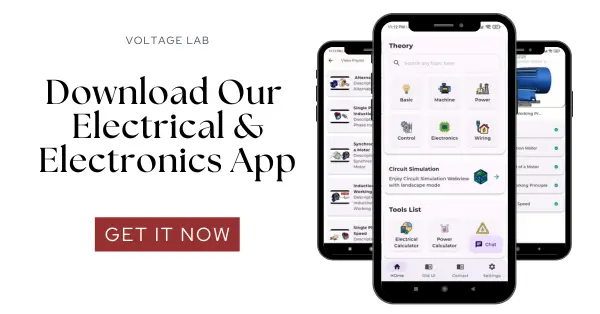It is very common to have questions like: can you plug a microwave into an extension cord? Today I am going to answer this question.
Is it Recommended?
When utilizing a microwave, you will frequently try to find an electrical outlet nearby. This isn’t always achievable, however. Consider utilizing an extension cord in this situation. Can you connect a microwave to an extension cord? is a question that many people ask. Is it secure?
People who read this article also read: Microwave Oven Uses and Functions | The Crazy Concepts You Missed
Extension cables are the power source of most small kitchen pieces of equipment, but a microwave? It’s better to be safe than sorry.
- While it is preferable to connect a microwave oven directly to an electrical outlet, there are certain acceptable reasons to utilize an extension cable.
- When purchasing a microwave extension cord, do your homework first. Some wires are more damaging than beneficial. Depending on how you approach it, this might be either safe or deadly.
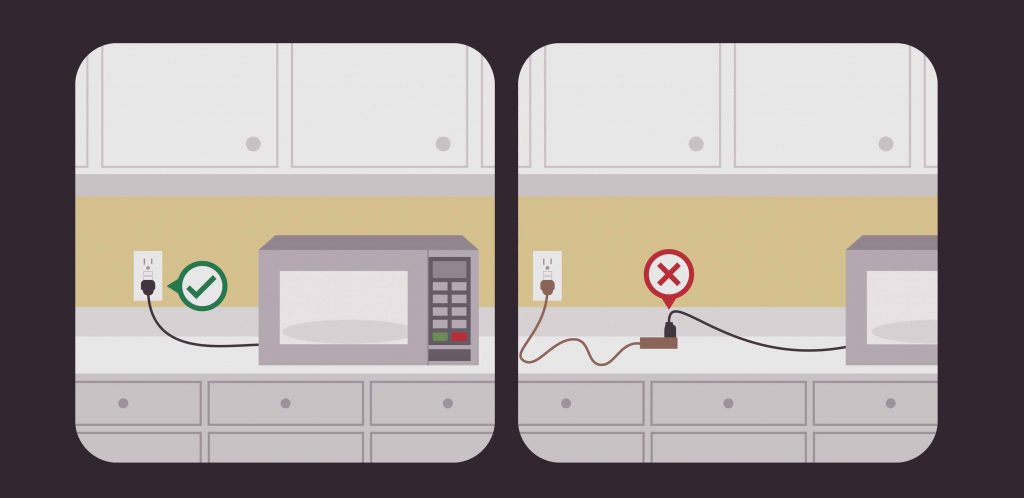
Verify your Oven’s Specs Before Making a Selection
- The power limit of microwaves in homes is up to 1000 Watts. This is 4.3 Amps at 230 Volts.
- Extension cords are generally rated for 13A and include a 13A fuse in the plug, both the plug for the microwave and the plug for the extension cable.
- Make sure the extension cord can deliver enough electricity to keep the microwave from overheating and melting. Yes, I did say “melt.” If you apply too much electricity to wires, they can melt.
- Under all circumstances, the U.S. Fire Administration advises against using an extension cord, and GE Appliances “highly” opposes it. They highlight the hazards of overloaded cables. By expanding the number of connections, more cables might jeopardize safety.
It is not recommended to plug cooking appliances through an extension cord.
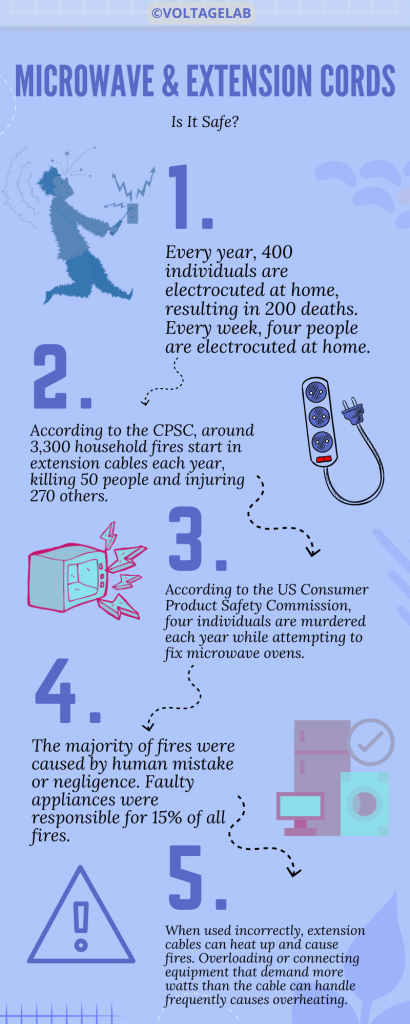
Precautions to Take When Plugging In A Microwave With An Extension Cord
You can do it correctly by taking a few measures. You can safely use a microwave after taking these steps.
1. Keep the following safety considerations in mind:
The majority of them have a fuse as well as short circuit protection. Your appliance will be completely secure in that circumstances.
2. Length:
As previously stated, as the cord’s length increases, its current carrying capability decreases. Choose a short, thick extension cable, similar to the one that came with the microwave, to minimize resistance (and consequently voltage loss).
People who read this article also read: What is the Working Principle of a Refrigerator? The Secrets of its High Energy Efficiency
3. Check the extension cord’s specs:
Instead of utilizing an improvised extension cord, you should check the standards. A current rating of at least 15 A should be used to power a heavy-duty device. In that situation, operating the microwave on the highest heat settings becomes simple.
4. Wattage Capacity:
Check the extension cord’s specifications to discover what watts it is rated for. You should never exceed this limit since overloading it will cause a fire. Moreover, you should also verify your microwave’s rated wattage, which may be found on the rating sticker on the back of the appliance. You might also look for it on the manufacturer’s website.
5. Periodically inspect the insulation:
An extension cord with torn insulation cannot be used. The risk of electrocution increases dramatically in this situation.
6. Gauge:
The gauge, as previously established, refers to the thickness of the wire. AWG is the standard unit of measurement (American Wire Gauge). The lower the AWG number, the greater the gauge, which is counter-intuitive.
7. Secure the plugs:
The first step is to secure the microwave connector in the extension cord. You must also make certain that the extension cord’s plug is firmly inserted into the electrical socket. Both of them must be entirely safe. Only then will you be able to prevent sparking. Using the microwave in that instance will be safe and simple. You should get a grounded extension cable since your microwave has a three-prong grounded connector. The grounding pin is the third pin on the connector. Remove this for your own safety; if the electronics fail, the grounding pin discharges the excess power to the earth, rendering it harmless.
If the grounding pin is removed, the extra energy will go to the next best conductor, which in this case is the metal body of your microwave oven, electrocuting anyone who comes into contact with it.
How to Pick the Right Extension Cord Dimensions
Most individuals have numerous extension cables on hand. What’s often overlooked is the fact that these extension cords must be the right size for the power load they’re carrying.
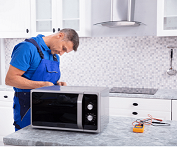
Ratings for Extension Cords
The amperage and power that an extension cable may safely transport are both governed by the wire gauge. Each extension cable should have an amperage rating labeled on a tag connected to it, however, this label may not always be present or visible. The number of watts and amperage drawn by the instrument or appliance connected to the extension cable must be determined before choosing an extension cord.
People who read this article also read: AC-DC and Filament of an Electric Bulb | A triangle love story
Extension Cord to Load Matching
The extension cords should be rated for loads that are at least equal to, and ideally more than, the need for properly running a tool. Extension cords with a length of fewer than 50 feet can be used according to the table below, however, runs longer than 50 feet should use the next heavier-sized chord to account for voltage drop owing to the wire’s natural resistance.
Safety Measures
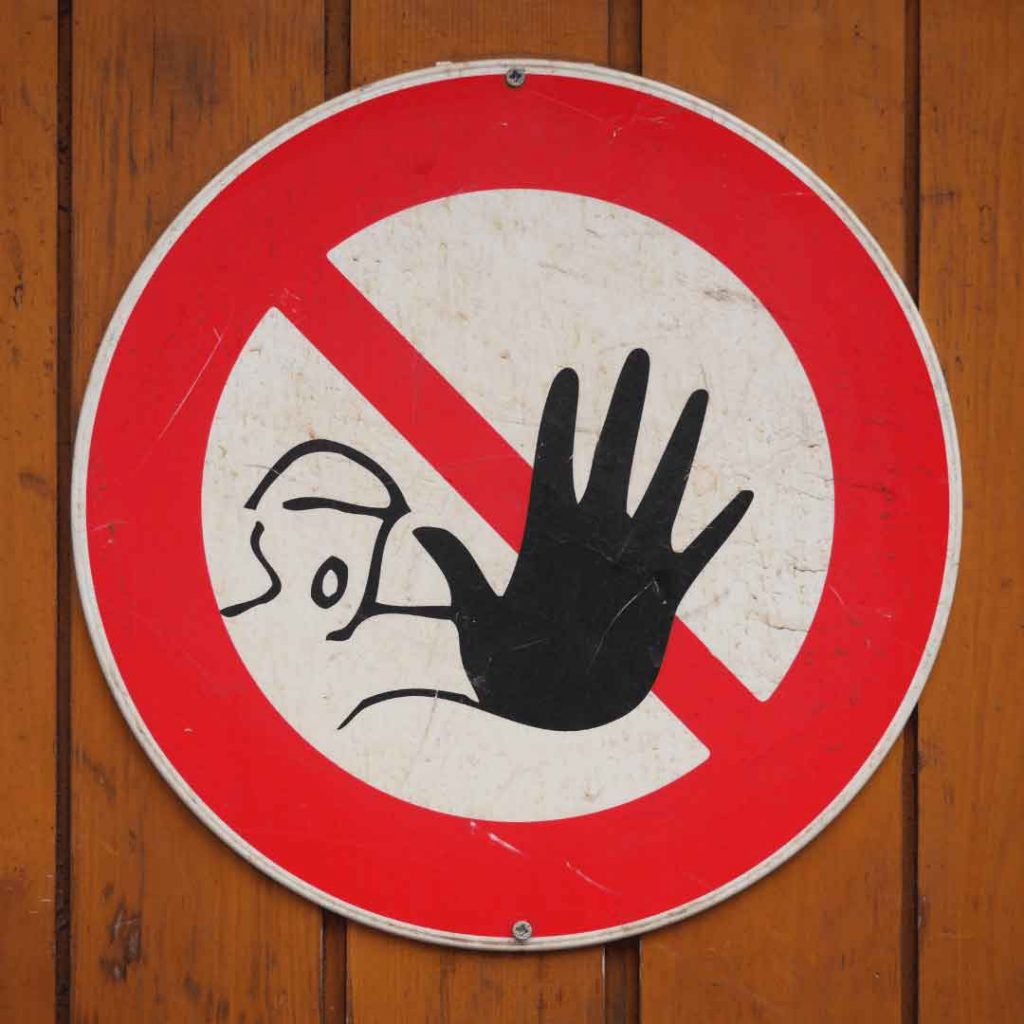
Users should avoid using cords that do not have a ground connection. Nicks and bare wires can cause electrical shock.
- Make careful to inspect the plug ends of your extension cables for any damage. Replacement plugs are available at your local hardware shop to extend the life of an extension cord assuming the cord is in excellent shape.
- An appropriate wire should be as short and as excellent quality as possible. Customers who must use an extension cable should choose one that is UL-listed and has three prongs, according to General Electric Appliances.
- Remember to look at the AWG rating. American Wire Gauge is the abbreviation for American Wire Gauge. A smaller gauge indicates that the product’s wires are thicker, allowing it to securely withstand more watts and amps.
Conclusion
I hope you enjoyed my ultimate guide to your question: can you plug a microwave into an extension cord?
Now, to answer your question can you plug a microwave into an extension cord. Would I recommend doing so? No, of course not. But if you do then look for the properties mentioned above for the safest results.
Now I’d like to hear from you: Do you know what the best extension cords are? Do you know which Cords you should buy?
Either way, let me know by leaving a quick comment below.

